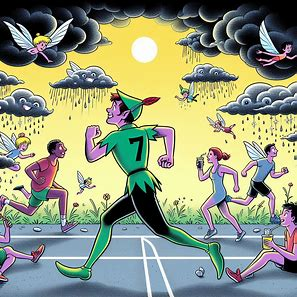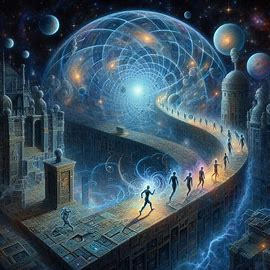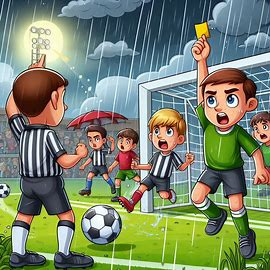Universal Brotherhood
In our quest to conquer the stars, we seem to be losing touch with the very essence of humanity. While we strive to bring planets closer, we drift further away from our neighbors. Our relentless drive to master nature has left us neglecting the exploration of our own selves. Advances in communication have shrunk the world, yet the invisible walls separating nations have grown taller. We've set foot on the Moon but have barely begun to understand the depths of our minds. In our pursuit to dominate nature, we’ve become slaves to our passions.
Science and technology are advancing at breakneck speed, yet scientific thinking and humanitarian values are fading just as quickly. In the race for power, honor, fame, and excellence, human values are being overshadowed. Divisions of religion, race, caste, and creed continue to fragment humanity. The economy, which could unite us, often creates deeper divides, leading to class struggles between the privileged and the disadvantaged.
Today, we witness the
unfortunate misuse of scientific and technological achievements to deepen these
divisions. Instead of fostering prosperity, science is often turned against
humanity. Technology, meant to provide comfort and sustenance, is used to threaten
the very existence of peace on Earth.
Selfish desires and sectarian views pose a grave threat to global harmony. It’s time for us to realize that there is only one race—the human race; one religion—the religion of humanity; and one sentiment worth cultivating—the sentiment of Universal Brotherhood. The only hobby worth pursuing is the hobby of service. Once we embrace these truths, a profound sense of unity will awaken within us, guiding us toward a world where we truly belong to one another.
The Whole World is Full of the Divine: A Journey to Self-Realization
“The whole world is full of the Lord; open your eyes and see Him.” Each soul is inherently divine. Our ultimate goal is to manifest this inner divinity.
The Upanishads, with their profound wisdom, challenge us to explore a fundamental question: "Just as the knowledge of a single lump of clay reveals the essence of all clay, what is that, knowing which we comprehend everything in the universe?" They guide us to the Atman—the true self—as the answer. “Know this Atman alone.” Swami Vivekananda echoed this sentiment, highlighting the immense debt the world owes to India for these profound insights: “Taking country by country, there is not one race on this earth to which the world owes so much as to the patient Hindu, the mild Hindu.”
The Bible too
resonates with this journey inward: “Seek you first the Kingdom of God within
and His righteousness, and everything else will be added unto you.” To
"Know Thyself" and realize "I am That I am" is to
understand our Swaroopa—our real, unchanging essence, distinct from the
transient body and mind.
The Vedas (Shruti) are the direct revelations perceived by the selfless, pure Rishis during their deep meditations. They unveil the ultimate truth of Brahman, described as "Sat-Chit-Ananda" (Eternal Existence-Consciousness-Bliss). According to Shruti, knowing our true Swaroopa is the ultimate purpose of life.
Whether alive or
deceased, we all seek a state of perpetual bliss, free from all sorrows. This
ultimate goal is described in various traditions as Salvation, Nirvana,
Perfection, Moksha, or Heaven. Beliefs vary—some see death as the end,
advocating a hedonistic approach: “eat, drink, and be merry.” Others believe in
a single life followed by heaven or hell and a day of judgment. Buddhists speak
of rebirth and Nirvana, while many consider earthly happiness as the highest
aim.
However, true Moksha
(liberation) is more profound. Stories abound of individuals leaving heaven for
various reasons, suggesting that its joy is temporary. Even the company of God
is not the ultimate liberation. Moksha, often referred to as 'Bhooma' (the
infinite), transcends all these notions.
Fear and sorrow arise
from the perception of duality—the feeling of separateness from others. Shruti
teaches that Moksha is attained by dissolving this sense of duality. When we no
longer see anything as separate from ourselves, fear disappears. The Jiva's
true Swaroopa is eternal existence and unchanging bliss, experienced in deep
sleep when unattached to the body-mind.
Our ignorance of
living in an "Intelligent Universe" blinds us to the fact that our
circumstances are not mere coincidences but the results of our actions,
governed by the universal law of cause and effect: “As we sow, so we reap.”
Through years of
learning and introspection, we must explore and develop the conviction that our
true Swaroopa is a singular, unchanging consciousness. We mistakenly identify
with our ever-changing body-mind. Reuniting with our true Swaroopa is the essence
of Yoga and Religion, leading to Mukti—freedom characterized by eternal,
unchanging bliss (Ananda).
We must firmly believe that our Swaroopa is one with Brahman: “I am Brahman.” Acting from this conviction, our outward-focused mind will naturally turn inward toward the Atman. The realization of Atman requires Shruti (listening), Tarka (reflection), and Anubhava (experience).
Our identification
with the body-mind and past worldviews creates doubt. By reflecting on and
understanding the logic and teachings of Shruti, we can affirm the unity of the
Jiva with Brahman. Maintaining focus on these truths through deep reflection
fosters an unwavering intellectual conviction.
Brahman-gyana
(knowledge of Brahman) is attained through listening, reflecting, and embodying
the Vedic conviction that “I am Brahman.” This requires preparing the mind over
time with good tendencies (Samskara) and achieving purity of mind
(Chitta-suddhi) through righteousness and selflessness.
We must contemplate
the most subtle truths, beyond past experiences and beliefs, and apply all our
reasoning to grasp the essence of what is heard. By avoiding unnecessary
arguments and seeking to understand Shruti's deeper message, we move closer to
the realization of our true nature.
IF HE EXIST
I drive joy there was a doctor in Benaras who
spent 7 minutes in the morning and evening for mediation on God. Knowing this,
his colleagues and friends laughed at him. One day they argued that he was
wasting 7 precious minutes on something, which he had been misled into
believing. The doctor replied, “Well, if God does not exist, I agree that I am
wasting 7 minutes a day. But, if He exists? I am afraid you are wasting your
entire lifetime. I prefer to waste 7 minutes rather than a lifetime. Why should
you grudge me the 7minutes joy that I derive 4m.-
ILLUSTRATED REVIEW:7thheaven moment of the India won t20world cup by 7 run scoring 176/7 , and in semi final India beat England scoring 171/7


































